Oct 5, 2023
A special lecture with Alison Buttenheim, PhD, MBA was held at the University of Pennsylvania on November 16, 2023.
Behavioral Economics: Policy Impact and Future Directions – Highlights from the NASEM Consensus Study Report
The hybrid event was co-sponsored with the Population Science Research Programs at the Abramson Cancer Center (ACC), the Health Policy Division in the Department of Medical Ethics and Health Policy (MEHP), and the Center for Health Incentives and Behavioral Economics (CHIBE).
May 9, 2017
 In The New York Times The Upshot, Massachusetts General Hospital and Harvard Medical School resident physician, Dhruv Khullar, M.D., M.P.P., looks at how the field of behavioral economics contributes to improving provider performance and patient engagement in health care decisions and, in particular, the research of PRC Director Kevin Volpp, MD, PhD.
In The New York Times The Upshot, Massachusetts General Hospital and Harvard Medical School resident physician, Dhruv Khullar, M.D., M.P.P., looks at how the field of behavioral economics contributes to improving provider performance and patient engagement in health care decisions and, in particular, the research of PRC Director Kevin Volpp, MD, PhD.
“A leader of this movement is Dr. Kevin Volpp, a physician at the University of Pennsylvania and founding director of the Center for Health Incentives and Behavioral Economics. He designs randomized trials around some of health care’s most important challenges: nudging doctors to provide evidence-based care; ensuring patients take their medications; and helping consumers choose better health plans.”
Apr 5, 2017
In the April 3 issue of JAMA, UPenn PRC Director Kevin Volpp, MD, PhD, and Jonathan S. Skinner, PhD, the Dartmouth Institute for Health Policy and Clinical Practice, discuss how research about behavioral economics in health care is useful when considering the challenges of replacing the Affordable Care Act.
Noting that “incentives to encourage healthy individuals to sign up for health insurance can be described as either carrots or sticks”, Volpp and Skinner observe that “the first principle from behavioral economics research is that carrots do not work nearly as well as sticks.” Research suggests that individuals tend to favor immediate gratification over long-term consequences, which is why young adults historically are less inclined to enroll in insurance plans and why many people are frustrated paying premiums for coverage they may never use. Volpp and Skinner note “health insurance is an 80-20 proposition; 20% of enrollees account for 80% of costs. If the least healthy patients can be moved off of the exchanges, this will allow for a substantial decline in premiums on the exchange for the 80% healthier people who remain” and that lowering health insurance premiums would make a difference.
Sep 20, 2016
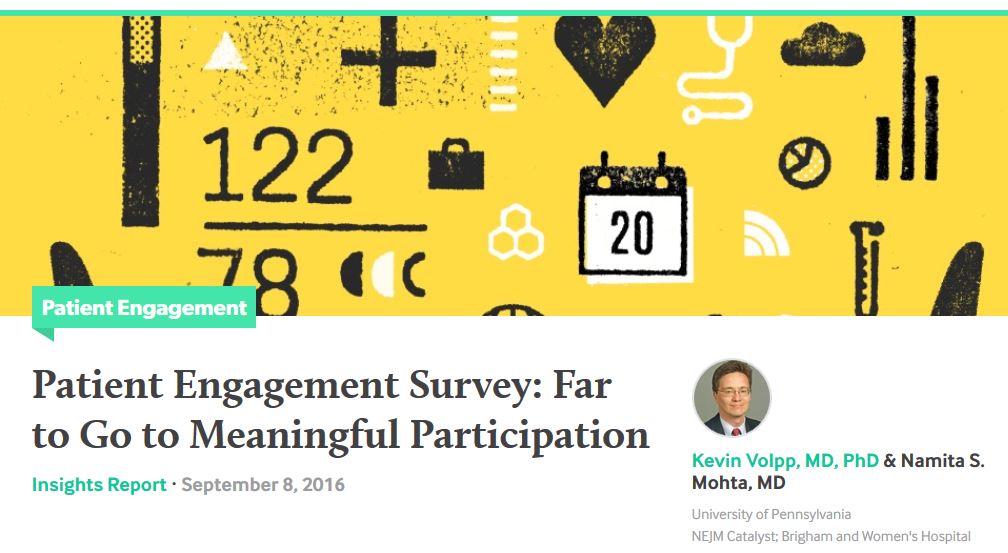
University of Pennsylvania PRC Director Kevin Volpp, MD, PhD, and Namita S. Mohta, MD of Brigham and Women’s Hospital, analyze the second NEJM Catalyst Insights Council Survey on Patient Engagement.
The majority of the respondents to the online survey sent in July 2016 were clinicians (53%), with executives (22%) and clinician leaders (25%) nearly evenly split. Most describes their organizations as hospitals or health systems.
“Nearly half of respondents say their patient engagement initiatives are having a major (14%) to moderate (34%) impact on quality outcomes,” said Volpp. “That’s pretty remarkable considering we are still in the earlier stages of patient engagement and that many potential approaches have yet to be fully scaled and integrated into practice. Interestingly, clinical leaders (60%) feel more strongly than executives (47%) and clinicians (43%) that their efforts to engage patients are working.”
Volpp and Mohta note that with the shift to value-based payment models, there may be more of an imperative to design and test new ideas to engage patients between visits that will improve both cost and quality.
Jul 29, 2016
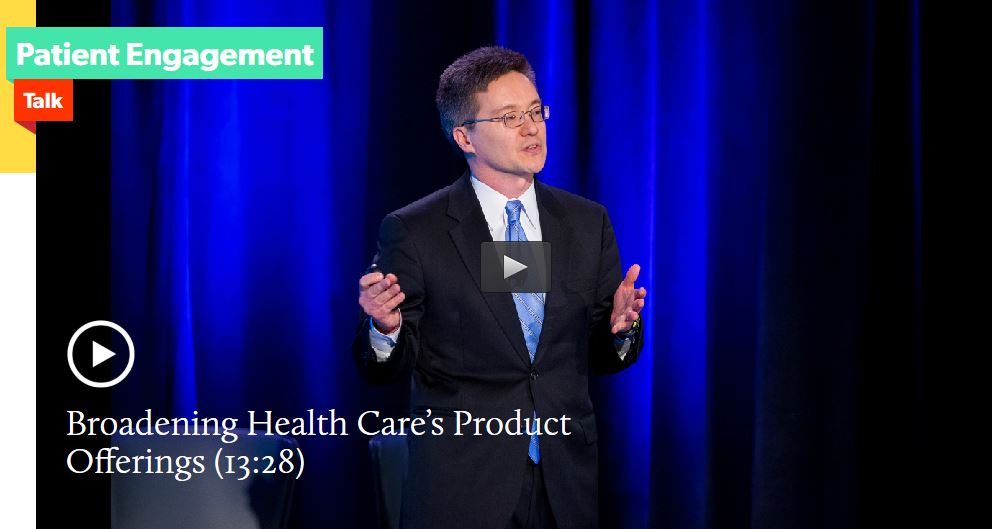
Kevin Volpp, MD, PhD. NEJM Catalyst Patient Engagement Talk
“Broadening Health Care’s Product Offerings.”
http://catalyst.nejm.org/videos/broadening-health-cares-product-offerings/
Jul 27, 2016
 PRC Director Kevin Volpp, MD, PhD, and PRC Researcher David Asch, MD, MBA, were recognized for their significant contribution to the fields of health services research and health policy with the AcademyHealth Article-of-the-Year Award.
PRC Director Kevin Volpp, MD, PhD, and PRC Researcher David Asch, MD, MBA, were recognized for their significant contribution to the fields of health services research and health policy with the AcademyHealth Article-of-the-Year Award.
Volpp, MD, PhD, is the founding Director of LDI’s Center for Health Incentives and Behavioral Economics (CHIBE), a Professor of Medicine and Vice Chairman for Health Policy of the Department of Medical Ethics and Health Policy at Penn’s Perelman School of Medicine, and a Professor of Health Care Management at the Wharton School.
Asch, MD, MBA, is Executive Director of the Penn Medicine Center for Health Care Innovation, a Co-Director of the National Clinical Scholars Program, and a Professor of both Medicine at Penn’s Perelman School of Medicine and Health Care Management at the Wharton School.
Originally published in the Journal of the American Medical Association (JAMA) in November of 2015, the winning paper and its study were the latest to address the issue of how best to improve patient outcomes via financial incentives. The project’s different tack was to test pay-for-performance incentives on just doctors, just patients and then on doctors AND patients together.
The award, which recognizes the year’s “best scientific work in the fields of health services research and health policy” was presented at AcademyHealth’s Annual Research Meeting in Boston on June 28 .
Jul 19, 2016
 On NPR’s Health News, PRC Director, Kevin Volpp, MD, discussed new strategies for changing health behaviors.
On NPR’s Health News, PRC Director, Kevin Volpp, MD, discussed new strategies for changing health behaviors.

Volpp suggests that “commitment contracts” produce better results than traditional workplace rewards programs when it comes to tying financial incentives to goals. Reward programs usually offer a lump payment at the end of a full year. Commitment contracts involve an upfront investment which participants recoup if they meet self-designed goals and forfeit if they do not. Volpp and colleagues at the Center for Health Incentives and Behavioral Economics have found that short-term goals are more successful than long-term, when it comes to health behavior changes, and that immediate financial loss has greater impact than far-in-the-future financial gain.
May 5, 2016
 In a JAMA editorial, Kevin Volpp, MD, PhD, discusses whether price transparency helps lower the cost of health care when pricing of services is a choice tool for deciding on a health care plan.
In a JAMA editorial, Kevin Volpp, MD, PhD, discusses whether price transparency helps lower the cost of health care when pricing of services is a choice tool for deciding on a health care plan.
Responding to a new study by Desai et al in the same May 3, 2016 issue of JAMA, Volpp says “there was no evidence that health spending declined in the settings where transparency tools were offered” and suggests consumers might benefit from employers providing context with cost. “(I)n the absence of credible information presented simultaneously on quality, many patients may likely assume that higher price means higher quality.”
Volpp concludes “it is not surprising that price transparency tools that offer patients as consumers information on relative prices fail to lower the rate of spending, given that this information is often offered without accompanying data about quality and for services that would exceed the deductibles of patients. Perhaps by providing meaningful relative information on price and quality and focusing on services with prices lower than a patient’s deductible, such tools could succeed in driving patients to choose higher-value services.”
Dr. Volpp is a UPenn PRC Director and principal investigator, along with founding the Center for Health Incentives and Behavioral Economics (CHIBE).
Mar 15, 2016

In the March 15, 2016 issue of Journal of General Internal Medicine, UPenn PRC Director Kevin Volpp, MD, PhD, UPenn PRC researcher David Asch, MD, MBA, and co-authors reported on a study to compare the effectiveness of individual versus team-based financial incentives to increase physical activity.
304 employees from a Philadelphia-based organization formed 76 four-member teams. Participants received daily feedback on a daily 7,000 step goal during intervention and follow-up periods. A participant on a winning team was eligible for a $50 award if he/she met the goal (individual incentive), a $50 award only if all four team members met the goal (team incentive), or a $20 award if he/she met the goal individually and $10 more for each of three teammates that also met the goal (combined incentive.) The control group received no other incentive. For the three financial incentive groups, every-other-day drawings were held during the intervention period.
Participants in the combined incentive group achieved their goal 35 percent of the time, nearly double the success rate for the control and team incentive groups (18 and 17 percent, respectively), and still higher than the average success rate for participants rewarded based on individual performance (25 percent). Compared to the control group, participants receiving the combined incentive had 1,446 more steps per day.
“The findings of our study shed light on how financial incentive programs can be used to change people’s behavior towards better health, and how physical activity interventions and wellness programs can be better designed,” said senior author Kevin G. Volpp, MD, PhD, a professor of Medicine and Health Care Management, and director of the Penn Center for Health Incentives and Behavioral Economics. “People are accountable to themselves but also to others and, in this vein, it may not be surprising that the incentive that provided rewards based on individual and team performance was most effective.”
Read more here:
http://link.springer.com/article/10.1007/s11606-016-3627-0
Mar 3, 2016
 In the February 16, 2016 issue of Annals of Internal Medicine, UPenn PRC Director Kevin Volpp, MD, PhD, UPenn PRC researcher David Asch, MD, MBA, and co-authors reported on a study to test the effectiveness of offering financial incentives to increase physical activity among overweight and obese adults.
In the February 16, 2016 issue of Annals of Internal Medicine, UPenn PRC Director Kevin Volpp, MD, PhD, UPenn PRC researcher David Asch, MD, MBA, and co-authors reported on a study to test the effectiveness of offering financial incentives to increase physical activity among overweight and obese adults.
Participants were divided among three groups. Researchers found the most powerful incentive was the possibility of losing money that would be taken away if a 7,000-step daily goal was not met. This finding suggest a new approach which may be helpful to the most sedentary overweight and obese.
Read more here:
http://annals.org/article.aspx?articleid=2491916
http://mobile.philly.com/beta?wss=/philly/health/sportsmedicine&id=368872741
Feb 23, 2016
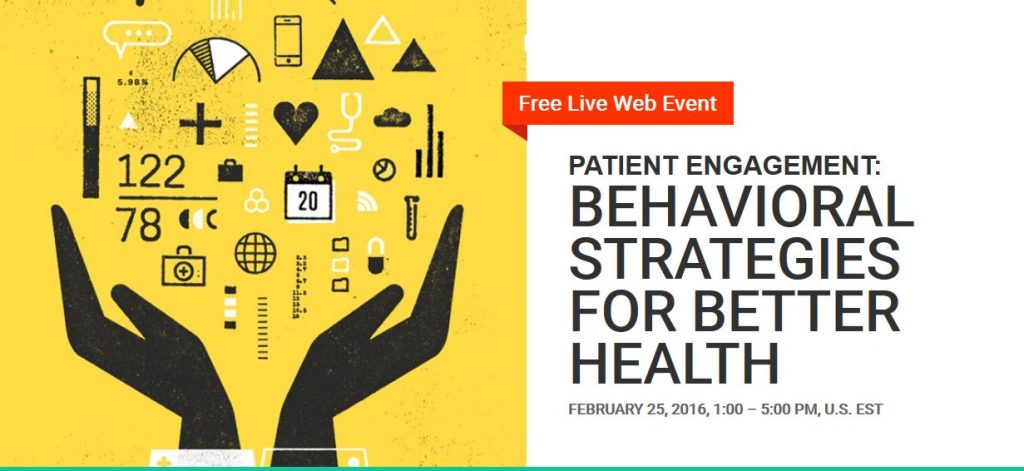
On Thursday, February 25, NEJM Catalyst produced a live web event titled Patient Engagement: Behavioral Strategies for Better Health. Hosted by the Center for Health Incentives and Behavioral Economics at the University of Pennsylvania, the event provided expert insight and real-world examples on ways to improve the quality and value of health care through patient engagement.
The event featured eleven preeminent business and clinical experts, with in-depth knowledge of:
- behavioral psychology
- habit formation
- behavioral economics
- social marketing
Experts shared their perspectives on ways to change patients’ health behavior across a wide range of clinical contexts. In addition to scalable, actionable ideas on how to motivate patients to take an active role in optimizing their health.
“As health care leaders and clinicians see more and more how the pressures to improve patient outcomes are driving health care organizations’ interests, it’s important to think broadly about how we influence patient behavior and how that helps to keep people healthy,” said Kevin Volpp, MD, PhD, Director of the Center for Health Incentives and Behavioral Economics; Vice Chairman for Health Policy, Medical Ethics and Health Policy; and Professor of Medicine, Medical Ethics and Health Policy and Health Management, Perelman School of Medicine and the Wharton School, University of Pennsylvania, UPenn PRC Director, and Lead Advisor for NEJM Catalyst.
Dec 22, 2015
Kevin Volpp, MD, PhD is a theme leader for NEJM Catalyst, a new collaborative platform that brings together health care executives, clinician leaders, and clinicians to share innovative ideas and practical applications for enhancing the value of health care delivery.
NEJM Catalyst provides information about practical innovations, insights from experts in the health care field, and leaders from provider organizations. It contains unbiased and objective content and articles, and an exchange of ideas and perspectives from across the health care community. The platform, from the NEJM Group that includes the New England Journal of Medicine, features live web seminars, daily blogs, white papers, case studies, video presentations, a digital newsletter, and the exchange of ideas. Advisors for live seminars will be editors of a NEJM sub journal and will facilitate dialogue to get the pulse of the community and then deliver pertinent information.
The four theme areas are:
- the new healthcare marketplace
- patient engagement
- care redesign
- leadership
Theme leaders were selected because each “has successfully implemented a change in his or her own organization,” according to NEJM.
Theme leaders include:
- Dr. Volpp, who is Professor of Medicine and Health Care Management at the Wharton School of the University of Pennsylvania
- Amy Compton-Phillips, MD, Executive Vice President, Chief Clinical Officer, Providence Health Services
- Leemore Dafny, PhD, Professor of Strategy and Director of Health Enterprise Management at the Kellogg School of Management, Northwestern University
- Stephen Swensen, MD, Medical Director for Leadership and Organization Development, Mayo Clinic College of Medicine
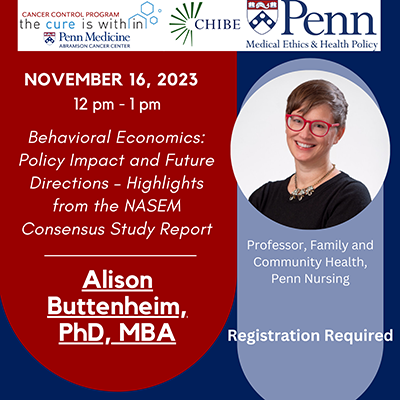

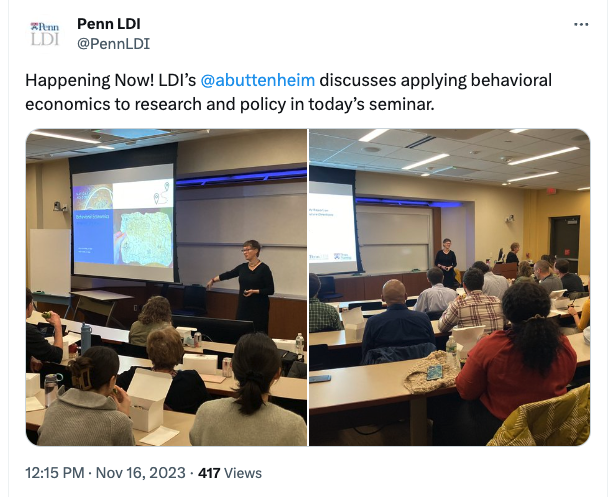


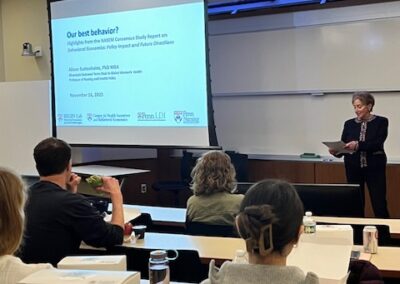
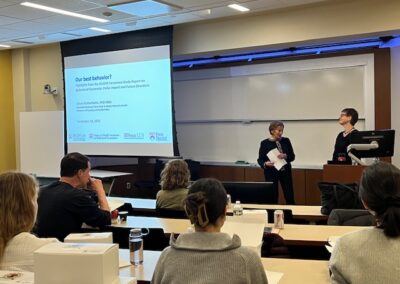

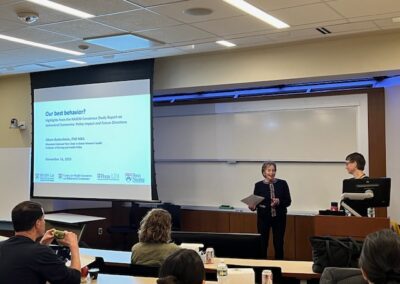




 In The New York Times
In The New York Times 

 PRC Director Kevin Volpp, MD, PhD, and PRC Researcher David Asch, MD, MBA, were recognized for their significant contribution to the fields of health services research and health policy with the AcademyHealth
PRC Director Kevin Volpp, MD, PhD, and PRC Researcher David Asch, MD, MBA, were recognized for their significant contribution to the fields of health services research and health policy with the AcademyHealth 

 In a
In a 
 In the February 16, 2016 issue of Annals of Internal Medicine, UPenn PRC Director Kevin Volpp, MD, PhD, UPenn PRC researcher David Asch, MD, MBA, and co-authors reported on a study to test the effectiveness of offering financial incentives to increase physical activity among overweight and obese adults.
In the February 16, 2016 issue of Annals of Internal Medicine, UPenn PRC Director Kevin Volpp, MD, PhD, UPenn PRC researcher David Asch, MD, MBA, and co-authors reported on a study to test the effectiveness of offering financial incentives to increase physical activity among overweight and obese adults.
